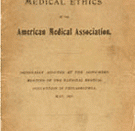Bioethics is the study of moral issues in the fields of medical treatment and research. The idea of bioethics is based upon several different codes of ethics, some of these being the ancient Greek Hippocratic oath, which stated above all to "do no harm," and the professional code of ethics written in the 18th century by Thomas Percival, a British doctor. The code written by Percival was the basis for the first official code of ethics that was written in 1846 by the founders of the American Medical Association. Another code was developed after World War II. This code was called the Nuremberg code, and it was established in response to the abuses in human experimentation by Nazi Germany. In the 1950s, new medical technologies developed that could keep someone alive longer, even if their heart did not work or if their brain did not function. This complicated the ethical issues of medical practice and research.
Some of the major issues concerned with bioethics are: abortion, stem cell research, fertility drugs, defining death, and genetic engineering. The defining of death and the different topics that it involves, such as euthanasia, will be discussed in detail in the following essay.
Before the development of advanced life support technologies, death was defined as the moment when one's heart stopped. Today, however, hospitals can keep a patient's heart beating artificially. This makes defining death very difficult. In 1930, if someone's heart stopped while they were in a coma, they would die. In the modern day, that person's life could be sustained for a long time, without the patient ever being conscious (see picture). Since these technologies can sustain life longer than previously thought possible, medical professionals are struggling to define death in a new way, one that takes into account the ability to...


